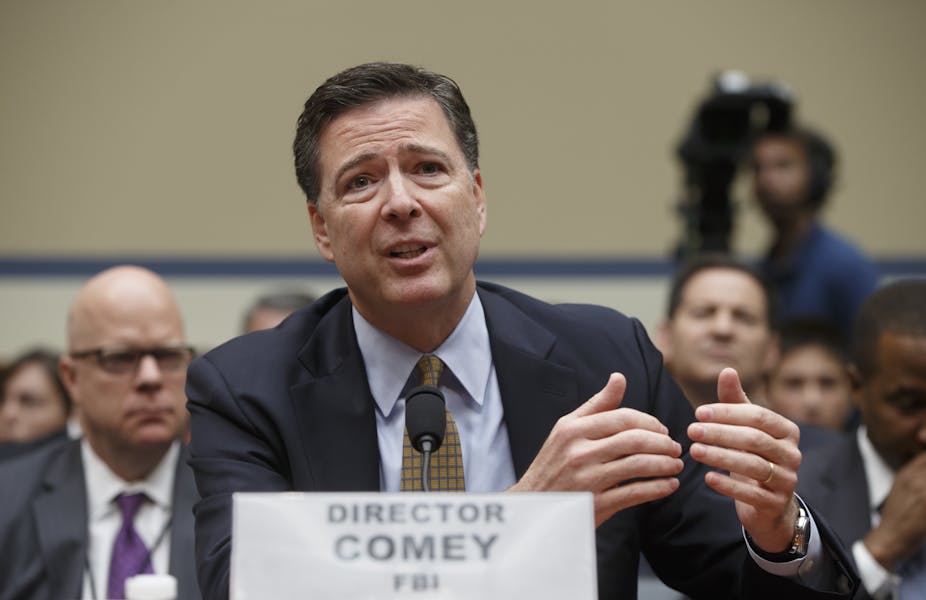FBI interference in U.S. elections is nothing new.
Last week, FBI Director James Comey reopened an investigation of Clinton’s use of a private email server as secretary of state. On Sunday, Comey announced the investigation was complete, and that there was no evidence that warranted charging Clinton with a crime. His actions set off a firestorm of protest, with public officials from both sides of the aisle claiming the FBI had violated a longstanding policy of avoiding actions that could be construed as interfering with an election. Many Americans believed the move to be unprecedented.
It’s not.
According to Beverly Gage, the author of “G-man: J. Edgar Hoover and the American Century” and professor at Yale University, this is not the first time an FBI director put his finger on the presidential election scale. As a fellow U.S. political history scholar, I wanted to dig deeper into the role of the director of the FBI and how Comey compares to his infamous predecessor, J. Edgar Hoover.
So, I asked Gage to talk more about the history of the FBI’s involvement in politics.
Balogh: James Comey, current FBI director, and J. Edgar Hoover, director of the bureau from 1924 to 1972 – who was probably best-known for amassing a list of “U.S. enemies” that included suspected terrorists and spies, as well as Martin Luther King Jr. – have recently been compared. Do you think the comparisons are fair?
Gage: Hoover occupied a more prominent role in American political life and culture than Comey does. He also exercised more power in Washington. That said, Hoover had a past of being involved in politics even as he claimed to head a nonpartisan, investigative agency. So, to that degree, I think Comey’s working within the Hoover tradition – participating in electoral politics but at the same time, claiming to be a nonpartisan agency.

Balogh: Is there a realistic way to lead the FBI during an election year and stay out of politics?
Gage: The FBI often conducts politically explosive investigations into corruption, or major crimes – that’s one of their jobs within the Washington bureaucracy. So, to some degree, this is unavoidable. I do think that over the last year, Comey has inserted himself more overtly into policy discussions, especially his statements about police and about Black Lives Matter - he suggested that activism around police brutality was making it difficult for police to do their jobs and placed them in greater danger. Whereas [with Clinton’s emails], if he could have avoided involvement in the investigation, I would imagine he would have preferred that.
Balogh: What steps were taken to counteract the legacy of J. Edgar Hoover by the FBI?
Gage: Today, the FBI director holds a very different position: There is a term limit of 10 years, although it can be waived. There’s also congressional oversight committees, freedom of information laws and more overt restrictions on the kinds of surveillance that the FBI can conduct. When Hoover was director, there was little accountability. Hoover really did exercise something close to total control.
In theory, the discretion and power of the FBI director is more limited now than it was during Hoover’s time. Of course, the FBI is still a bureaucracy and an intelligence agency that operates partly in secret. So, it’s always a little hard to tell what’s happening behind the scenes.
Balogh: Do you think the steps taken, the limits on discretion and the amount of power, are helpful?
Gage: Yes, it’s certainly helpful. During the 1970s and 1980s, there was more attention on constraining the power of the FBI and the other intelligence agencies, particularly coming out of the Church Committee, which was formed in 1975 to study government operations, especially intelligence activity. But then the Patriot Act and 9/11 broadened intelligence agencies’ powers. We also see many instances of surveillance that people have challenged as either politically inappropriate or unconstitutional. For instance, in the 1980s, after Hoover’s death and shakeups at the FBI, the bureau was still conducting surveillance of left-wing organizations.
It hasn’t been a steady trend, but the constraints matter. They don’t solve every problem – the FBI remains in a funny position where it’s a law enforcement agency, but it’s also an intelligence agency.

